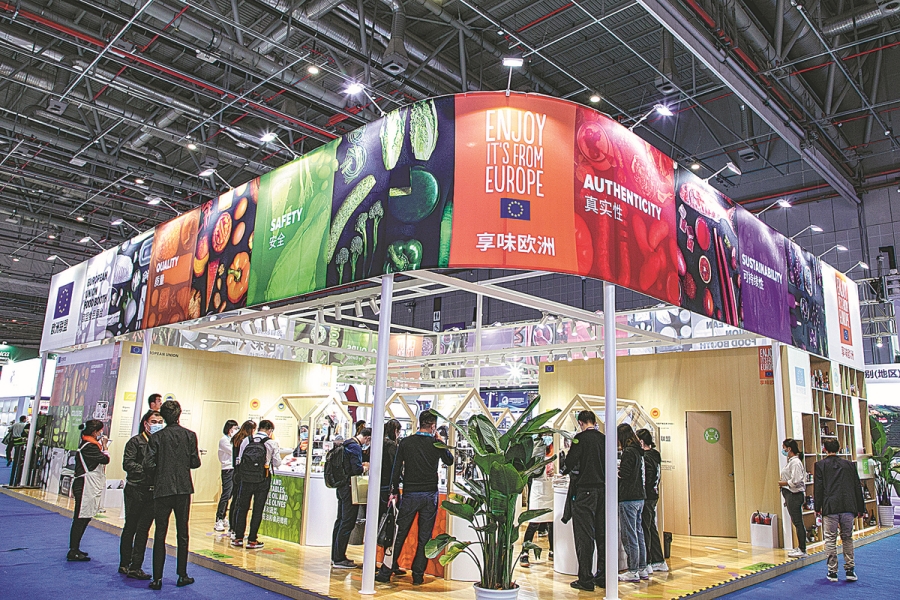Sino-EU cooperation benefits world economy

Visitors check the European Union food booth at the 4th China International Import Expo in Shanghai on Nov 7. Economic and trade cooperation between the EU and China has proved to be resilient and vigorous despite COVID-19. [Photo for China Daily]
BRUSSELS-Although the global economy is facing mounting uncertainty and sluggish growth due to the COVID-19 pandemic, economic and trade cooperation between China and Europe can act as a counterbalancing force and help stabilize the world.
Economic and trade cooperation between the European Union and China has proved to be resilient and vigorous despite the negative consequences of COVID-19.
China has overtaken the United States to become the EU's largest trading partner in 2021, with bilateral trade volume hitting record highs. Last year, the EU also became China's second largest trading partner, and in the first two months of 2022, it overtook the Association of Southeast Asian Nations for the top slot.
In 2021, bilateral trade between China and the EU was worth over $800 billion, a new all-time high. Two-way investment exceeded $270 billion. Bilateral trade increased significantly in various sectors, such as aerospace, biology, electronics and others.
The two sides have upgraded and extended their communication channels, including the EU-China High-Level Economic and Trade Dialogue, as well as regular consultations between local governments and enterprises.
Juergen Friedrich, chairman and CEO of Germany Trade& Invest, the country's foreign trade and inward investment agency, said China has been Germany's most important trading partner for six consecutive years, and the aggregate volume of bilateral trade reached a new record in 2021.
China is one of the world's most important growth markets and is also an important partner for Germany in its efforts to tackle global challenges, such as the pandemic and climate change.
Horst Loechel, a professor at the Frankfurt School of Finance and Management, described trade between the EU and China as a win-win for both sides, saying he expects the growth trend to continue.
In March 2021, a landmark agreement between the EU and China to protect over 500 Chinese and European geographical indications entered into force. Among the early beneficiaries of the agreement were wines produced on Greece's Samos Island.
"China is an extremely important market or potentially important market for Greek wines. I think that as wine is becoming more popular in China, in just a few years' time, Greek wines will conquer the market there," said Konstantinos Lazarakis, Greece's first Master of Wine.
Last year also saw an increasing number of freight trains, also known as "steel camel fleets", transporting goods between China and Europe. In 2021, the number of two-way freight train trips reached 15,000, carrying 1.46 million twenty-foot equivalent units, up 22 percent and 19 percent year-on-year, respectively.
This train connection is also highly valued by producers and importers in Spain. Gonzalo Jerez, director of Spanish logistics company Trans-Glory, said it had played a key role as a sustainable and reliable mode of logistics during the worst days of the pandemic.
In Serbia, the Belgrade to Novi Sad section of the Chinese-built Hungary-Serbia railway opened in March. The flagship railway project has often been described as a symbol of cooperation between China and the central and eastern European region.
China and Europe are major markets with a shared strategic interest in promoting development through green and digital partnerships. The two sides are also in sync with their ambitious commitments to make a green and digital transformation, reduce carbon emissions and mitigate climate change.
China's Shanghai Electric Power Company is putting its expertise in wind, solar and hydrogen power into use on Malta's Gozo Island, which it aims to turn into the EU's first carbon-neutral island. The company is also involved in other green power projects in Malta and Montenegro.
Loechel said it is vital for Europe and China to cooperate on green energy. The EU unveiled its European Green Deal in 2019, and the bloc aims to reach carbon neutrality by 2050. China has committed itself to peak carbon emissions by 2030 and becoming carbon neutral by 2060. This "template for cooperation" in green energy is very important for the whole world, Loechel said.
China and Europe have made continuous efforts to strengthen their partnership in digital trade and finance. Bilateral e-commerce cooperation is booming, and both sides are jointly developing cross-border e-commerce industrial parks.
Several Chinese companies, such as Huawei and ZTE, are actively involved in the expansion of Europe's 5G network. Bank of China and China Construction Bank are also set to launch their digital currency electronic payment systems and fintech labs.
Loechel added that Europe and China are both committed to addressing safety issues over digitalization and have drafted regulations and policies to protect the private data of consumers.
























